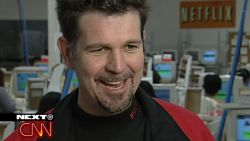The Dave Chappelle comedy special, “The Closer,” has thrust Netflix into its biggest crisis ever. It’s a mess of the company’s own making.
Chappelle’s special, which debuted on Netflix earlier this month, caused a firestorm inside and outside the company. It includes several jokes about trans people that some found deeply offensive. Netflix has stood by the special, even after it was criticized as transphobic by some LGBTQ+ advocates, artists and even Netflix’s own employees.
“Promoting [trans-exclusionary radical feminist] ideology (which is what we did by giving it a platform yesterday) directly harms trans people,” Terra Field, a senior software engineer at Netflix, tweeted earlier this month. “It is not some neutral act.”
But Netflix’s strategy — offering a trove of diverse content without much editorial supervision — has made the company a huge success. Intervening in Chappelle’s special isn’t so simple.
How Netflix got here
Netflix (NFLX) went from mailing DVDs to your home to one of the most powerful global brands by creating a streaming platform with an endless amount of diverse content created with a mostly hands-off approach. This strategy is what allowed Netflix (NFLX) to grow to 213 million subscribers and create out of nowhere hits like “Squid Game.”
Yet what makes Netflix unique — the scale, resources and strategy to create a hit without promotion — is also what has landed the company in hot water with “The Closer.” By letting Chappelle, whose thoughts on the trans community courted controversy for Netflix before, release another comedy special and do so without much interference, the streamer risks alienating customers and even its own employees.
But if Netflix shies away from content like Chappelle’s, it would be going back on the artistic freedom that has attracted star talent to its platform for years. That star talent is a big reason why Netflix is on top of the streaming marketplace.
How Netflix navigates this tightrope will determine the evolution of the company. So far, it has not handled this controversy well.
Netflix vs. the competition
In the past, some of Netflix’s biggest rivals in media have handled controversy around its stars by taking definitive action.
The most extreme example was when the Disney-owned ABC canceled its hit sitcom “Roseanne” in 2018 after the show’s biggest star, Roseanne Barr, went on a racist Twitter rant. The show would return as “The Conners,” but Barr was not included. “Roseanne” was one of the most popular and highly-rated programs on TV at the time.
Would Netflix have pulled “Roseanne” off the air? It’s unclear. Yet, the Chappelle controversy shows that the company’s strategy of offering everything for everyone on a global scale does have its downsides.
But Netflix’s strategy is unlikely to change, according to Zak Shaikh, vice president of programming at research-based media firm Magid.
“Netflix’s goal is to be TV, and to be that they have to cover everything, and that’s their strength,” he said. “They have so much content. It’s a volume play to cover all of those bases. But when you do that, when you take risks, you’re going to cause some controversy. It’s impossible not to.”
Shaikh added the key difference with Netflix and competitors like ABC is that Netflix doesn’t sell ads and thus a special like Chappelle’s can’t upset advertisers.
“So the question becomes, is this upsetting subscribers?” he said. “If it’s not, they’re unlikely to change course.”
CEO ‘screwed up’ but doubles down
Ted Sarandos, the company’s co-CEO and chief content officer, acknowledged he could have done better in terms of the Chappelle controversy.
In an interview with Variety Tuesday, Sarandos admitted he “screwed up” the internal communication with Netflix’s staff, some of whom staged a walkout Wednesday.
Sarandos apologized for his communication, but told the Wall Street Journal that he isn’t second guessing the decision to air Chappelle’s special and Netflix doesn’t plan on removing it.
“We have articulated to our employees that there are going to be things you don’t like,” Mr. Sarandos told the Journal. “There are going to be things that you might feel are harmful. But we are trying to entertain a world with varying tastes and varying sensibilities and various beliefs, and I think this special was consistent with that.”
How the Chappelle Netflix controversy ends and what changes come of it — if any — is still yet unknown. But if Netflix wants to continue to operate as a company that supports a strategy of diverse content and creative freedom at the same time then it needs to figure out how to better respond to a backlash like this one.
Because with its an ever-expanding library of content, this controversy is unlikely to be its last.























